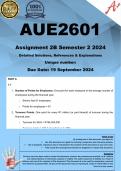AUE2601
Assignment 2B Semester 2 2024
Detailed Solutions, References & Explanations
Unique number:
Due Date: 19 September 2024
PART A
1.1
1. Number of Points for Employees: One point for each employee or the average number of
employees during the financial year.
o Shemu has 81 employees.
o Points for employees = 81
2. Turnover Points: One point for every R1 million (or part thereof) of turnover during the
financial year.
o Turnover for 2024 = R194,200,000
o Turnover points = 194.2 (rounded up to 195)
Terms of use
By making use of this document you agree to:
• Use this document as a guide for learning, comparison and reference purpose,
• Not to duplicate, reproduce and/or misrepresent the contents of this document as your own work,
• Fully accept the consequences should you plagiarise or misuse this document.
Disclaimer
Extreme care has been used to create this document, however the contents are provided “as is” without
any representations or warranties, express or implied. The author assumes no liability as a result of
reliance and use of the contents of this document. This document is to be used for comparison, research
and reference purposes ONLY. No part of this document may be reproduced, resold or transmitted in any
form or by any means.
, +27 67 171 1739
PART A
1.1
1. Number of Points for Employees: One point for each employee or the
average number of employees during the financial year.
o Shemu has 81 employees.
o Points for employees = 81
2. Turnover Points: One point for every R1 million (or part thereof) of turnover
during the financial year.
o Turnover for 2024 = R194,200,000
o Turnover points = 194.2 (rounded up to 195)
3. Third-party Liability Points: One point for every R1 million (or part thereof) of
third-party liabilities at year-end.
o Third-party liabilities for 2024 = R67,388,000
o Liability points = 67.4 (rounded up to 68)
4. Shareholders Points: One point for every individual who, at the end of the
financial year, is a shareholder.
o Number of shareholders = 9
o Shareholders points = 9
Public Interest Score Calculation:
Total PIS=81(employees)+195(turnover)+68(liabilities)+9(shareholders)=353
According to the Companies Act, a company with a Public Interest Score of 350 or
more is required to have its financial statements audited. Since Shemu has a PIS of
353, its financial statements need to be audited, not independently reviewed.
Disclaimer
Extreme care has been used to create this document, however the contents are provided “as is” without
any representations or warranties, express or implied. The author assumes no liability as a result of
reliance and use of the contents of this document. This document is to be used for comparison, research
and reference purposes ONLY. No part of this document may be reproduced, resold or transmitted in any
form or by any means.
, +27 67 171 1739
1.2 Discussion on "Absolute Assurance" for the Financial Statements
1.3
1.4 Absolute assurance implies a guarantee that the financial statements are
completely free from any errors, misstatements, or fraud. This level of assurance
suggests perfection in reporting and a 100% guarantee of accuracy.
Why Absolute Assurance Cannot Be Provided:
1. Nature of Auditing Standards: Auditing standards, such as International
Standards on Auditing (ISA), only provide for "reasonable assurance" because
auditors rely on sampling and are not required to test every transaction. This
approach limits the extent of the audit to a reasonable level of certainty.
2. Inherent Limitations of Audits: Factors such as the use of estimates, reliance
on management’s representations, and the potential for collusion or fraud
inherently limit the level of assurance that can be achieved.
3. Risk of Material Misstatement: Auditors assess the risk of material
misstatement but cannot eliminate this risk entirely due to the complexities and
judgments involved in preparing financial statements.
4. Professional Judgment: Auditors use professional judgment to determine the
extent of testing and the nature of audit procedures, which inherently introduces
some level of uncertainty.
Absolute assurance is unattainable in an audit because the process is designed to
provide reasonable, not absolute, assurance about the financial statements' accuracy
and compliance with relevant standards. Therefore, the directors of Shemu should
adjust their expectations and understand that an audit will provide a high, but not
absolute, level of assurance regarding the accuracy of the financial statements.
2.1 Recommendations for Audit Committee Appointment
According to the Companies Act 71 of 2008, the audit committee plays a crucial role
in ensuring the integrity of financial reporting, the effectiveness of internal controls,
and the independent oversight of the external audit process. The Act outlines specific
criteria for the composition and independence of the audit committee members. Here's
Disclaimer
Extreme care has been used to create this document, however the contents are provided “as is” without
any representations or warranties, express or implied. The author assumes no liability as a result of
reliance and use of the contents of this document. This document is to be used for comparison, research
and reference purposes ONLY. No part of this document may be reproduced, resold or transmitted in any
form or by any means.





